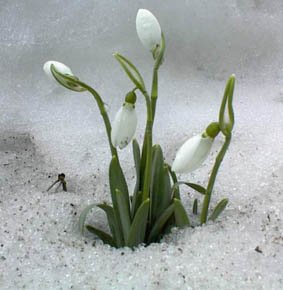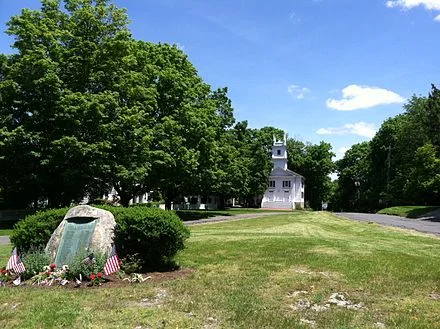
‘The very three a.m.’
“The Thaw” (1991), by Nikoklay Anokhin
‘‘The most serious charge which can be brought against New England is not Puritanism, but February.... Spring is too far away to comfort even by anticipation, and winter long ago lost the charm of novelty. This is the very three a.m. of the calendar.’’
— Joseph Wood Krutch (1893-1970), American essayist, critic and naturalist. In the 1940s, he lived in Redding, Conn.
Snowdrops piercing the snow.
Slow it down
February, from the ‘‘Très riches heures du Duc de Berry.’’
“February... Now more than ever one must remind oneself that it is wasteful folly to wish that time would pass, or - as the puritanical old saying used to have it - to kill time until it kills you.’’
— Joseph Wood Krutch (1893-1970), a naturalist, scholar and writer who lived in the semi-countryside of Redding, Conn., before moving to Arizona. He famously wrote about the song of the spring peepers as a sound of spring coming on, and so of hope. Mark Twain also lived in Redding.
The center of Redding, Conn.
A spring peeper.
“Mother Bear and Cubs,’’ in Huntington State Park, Redding.
In partial defense of February
The most serious charge which can be brought against New England is not Puritanism, but February.... Spring is too far away to comfort even by anticipation, and winter long ago lost the charm of novelty. This is the very three a.m. of the calendar.
~- Joseph Wood Krutch
This is one of the once-renown essayist's most famous lines. But we don't entirely agree with him. The brighter mornings and the faster melting of ice and snow, compared to January, in this shortest month make February suitable for hope. A mild February day can produce a brief moment of ecstasy.
Snow's 'pure' beauty
"To be part of summer one must feel a part of life, but to be part of winter one must feel a part of something older than life itself....A snowscape is white of course, and of course white is the universal symbol of "purity''. But its beauty is also a matter of "pure'' form, without color and without accent. Most important of all, perhaps, it is "pure'' after a fashion peculiar to that which is not alive, since all life is "impure'' both in the sense of being mixed and in the sense of being warm in various ways, including the sexual.''
-- Joseph Wood Krutch
Politics in a well-mannered micropolitis
Shops in downtown Montpelier.
Adapted from Robert Whitcomb's Oct. 27 "Digital Diary,'' in GoLocal24.com
Politics in Rhode Island, where I live, can be pretty dispiriting because of excessive identity politics, some local corruption and a low level of intelligence, education and integrity and a high level of provincialism among too many politicians. (That’s partly due to local journalists and demagogic radio talk show hosts discouraging good people from running for office and very low voter turnout in primary elections.)
So I drove to Vermont last week to see a little bit of Norman Rockwell-style politicking.
The drive to and from Montpelier was a trip up and down memory lane. I headed west on Route 2 through northern Massachusetts’s by turns pretty and depressing villages and mill towns. The foliage was at its most colorful and the sky was azure. I took a slightly different route than usual, turning off Route 2 well before Greenfield and heading north through unexpectedly high and steep hills and deep countryside near Northfield before getting on Route 91, which runs north up the gorgeous Connecticut River Valley, through which I had driven so many times before.
The farther north I went, the less vivid the foliage; the North Country’s maximum color was about three weeks ago. But much of the landscape still glowed.
In Montpelier, I had dinner with two old friends, Josh Fitzhugh and his wife, Elizabeth. Josh is running as an anti-Trump Republican state Senate candidate for Washington County. We ate in an excellent restaurant called Sarducci’s in downtown Montpelier, which was crowded and cheery. Indeed, the city, although America’s smallest state capital, was surprisingly lively with lots of people on the sidewalks on a mild night.
After dinner we strolled to a small cable-TV studio, where Josh and some rivals had a “debate,’’ though it was really just a discussion, on such big local issues as preventing dirty water from entering Lake Champlain. Everyone was civil. The candidates had grown to know each other over the years in the intimate and generally friendly and honest atmosphere of the Green Mountain State.
Elizabeth (nicknamed “Wibs’’) and I sat in the waiting room outside the studio but we only heard a little of the “debate’’ on the big screen in front of the room because of technical problems. Sitting with us was a nice man called Jerome Lipani, like many Vermonters from New York City, who promoted some Bernie Sanders-style reforms to us.
Mr. Lipani, artist, was polite and good-humored and, I inferred, pragmatic, as was now-Senator Sanders, a socialist, when he was mayor of Burlington. Indeed, with a few exceptions, such as outgoing Gov. Peter Shumlin’s overreaching for a single-payer healthcare plan, pragmatism rules. Thus the same state will elect such moderate Republicans as the late Gov. Richard Snelling, such Democrats as former Gov. Howard Dean (who ran state government as a middle-of-the road fiscal conservative) and a professed (but realistic) socialist such as Bernie Sanders. Vermont candidates are judged by their records and characters far more than by their party labels. Given the increasing tendency in the U.S. to vote strictly by party and not by individual this was heartening.
Reliving again the state’s tradition of civility and civic-mindedness was a tonic, and I rather dreaded driving back to the nastiness of megalopolis. By the way, I discovered that Montpelier along with Barre, form something called a "micropolitan area'' and that tiny Barre and Montpelier are called the Twin Cities. Vermont cute!
xxx
An old book by Joseph Wood Krutch, The Twelve Seasons: A Perpetual Calendar for the Country, might help you get through the New England winter, especially in beautiful but, er, rigorous Vermont, New Hampshire and Maine. He sees each month as a season.
Indeed, every day is a season, emotionally speaking.
Hot, lazy and full
"August creates as she slumbers, replete and satisfied."
-- Joseph Wood Krutch








